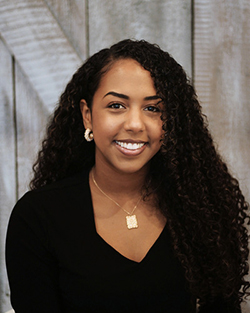When an honours high school student starts university, everyone expects they will do well. But as Ashley Hill (BA’13) found out, the path to success seems only to be paved for some.
Hill’s post-secondary journey started the way it does for many students: she enrolled in standard first-year courses like macroeconomics and psychology. The trouble was, she was unfamiliar with the subjects and struggled to engage.
It wasn’t just the course material she had a hard time adjusting to. Hill was suddenly in much larger classes than she’d had in high school. The classes were filled with students who didn’t look like her. They had laptops and appeared to already know when and how to take notes. Everyone else seemed to understand the expectations around required readings.
Hill was caught off guard; no one had prepared her for the culture and pace of university. As the first person in her immediate family who would go on to graduate university, she had no one to turn to for guidance. “It feels like you’re lost in a current and you’re just being knocked around, swept in whatever direction, because no one taught you how to swim at that level and speed,” Hill says.
After a year of struggling, Hill received a letter suggesting she leave the program and come back when she was better equipped to handle the workload.
She had been academically dismissed.
Receiving proper support
A family friend soon connected Hill with Quenta Adams (BA’93), who was then-director, advising and access services and is now assistant vice-provost of student engagement and success at Dal. Adams is one of the Dal alumni and raising awareness of supports like Dal’s Transition Year Program and Black Student Advising Centre.
 “Once I got connected with Quenta, I never left,” Hill recalls. “She was my lifeboat.”
“Once I got connected with Quenta, I never left,” Hill recalls. “She was my lifeboat.”
Shown right: Ashley Hill, founder and executive director of the PREP Academy.
Adams helped Hill make a plan. They got Hill re-admitted. They mapped the rest of her degree, making sure she had the tools and support she needed to succeed.
“My first step is to always have students tell me their story, to build that relationship,” Adams says. She is careful not to steer students explicitly, but to gently guide them and help them figure out their own path. “The students have the tools. They just may not necessarily be sure how to unpack them or how to use them.”
It was exactly the type of individualized attention Hill had been missing. But Hill knew it could have been even mor

